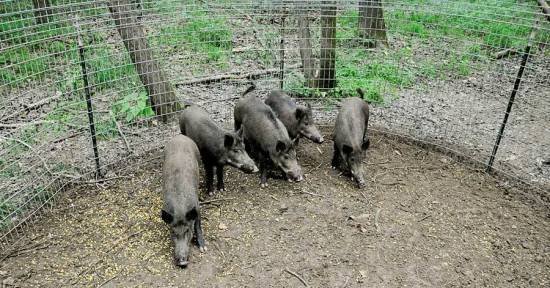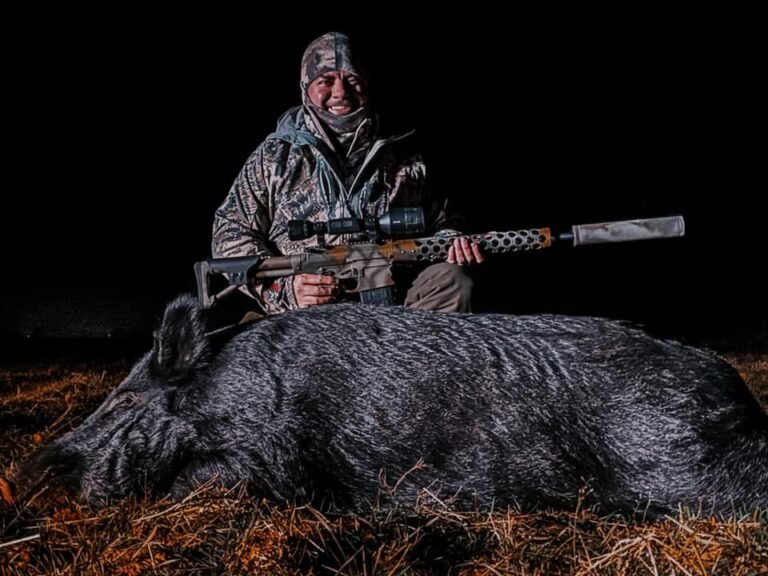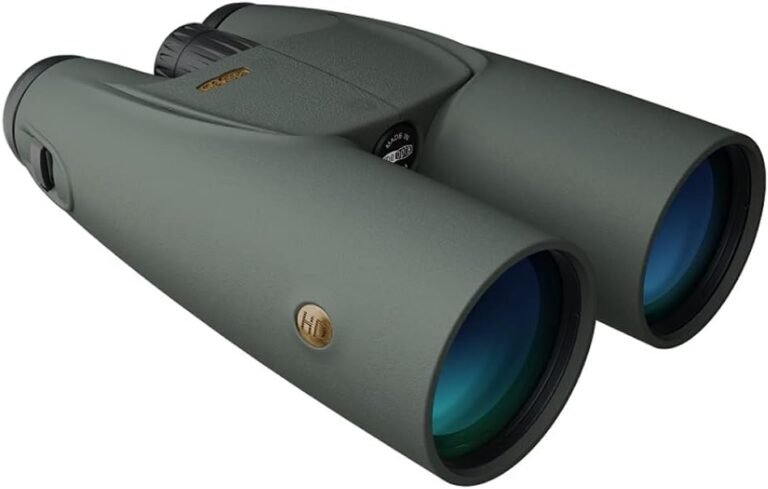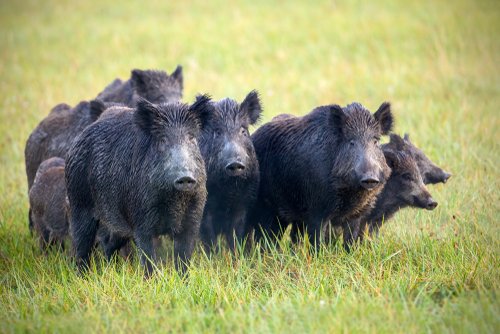Hog Hunting in the Heart of the Hills: West Virginia’s Best-Kept Secrets
West Virginia hog hunting is more than just a hobby or pastime in the beautiful state of West Virginia – it’s a beloved outdoor adventure that brings together nature enthusiasts, thrill-seekers, and avid hunters from all walks of life. With its vast forests, rolling hills, and abundant wildlife, West Virginia provides the perfect backdrop for this adrenaline-pumping pursuit.
Whether you’re an experienced hunter or someone looking to try something new, hog hunting in West Virginia offers an exciting and challenging experience like no other. West Virginia’s diverse landscape not only offers breathtaking scenery but also provides excellent opportunities for hog hunting.
The state is blessed with abundant dense woodlands, sprawling meadows, and hidden valleys – ideal habitats for wild hogs to roam freely. As a result, hog hunting has become increasingly popular among locals and visitors.
Feral hog population in the state
Feral hogs in West Virginia can be traced back to the early 1900s when settlers introduced these adaptable creatures into the wild for various purposes, such as food sources or sports. Unfortunately, over time, some escaped captivity or were purposefully released into the wild by misguided individuals. This led to the establishment of feral populations that quickly multiplied and began wreaking havoc on the local ecosystem.
The feral hog population in West Virginia has experienced significant growth over the years due to their prolific breeding habits and remarkable adaptability to different environments. These intelligent creatures are known for their destructive feeding habits, which can devastate native wildlife species and their habitats.
Recognizing this threat to both biodiversity and agricultural interests, measures have been taken by wildlife management agencies to control and manage these invasive animals through regulated hunting. Nowadays, hog hunting in West Virginia serves a dual purpose: it provides an exciting recreational activity for hunters while helping mitigate the ecological damage caused by feral hogs.
By participating in this sport, hunters contribute to the conservation efforts to balance wildlife, habitat preservation, and human interests. West Virginia hog hunting tips: When venturing into the world of hog hunting in West Virginia, it’s important to familiarize yourself with the state’s regulations regarding bag limits, licensing requirements, and permitted hunting seasons.
Additionally, gaining knowledge about the behavior and habits of feral hogs will significantly increase your chances of success. Stay tuned as we delve into further details on understanding feral hogs and explore popular hunting locations in West Virginia!
Understanding Feral Hogs
Description of Feral Hogs and Their Characteristics
When it comes to hog hunting in West Virginia, understanding feral hogs is essential. These wild beasts are descendants of domestic pigs who escaped or were released into the wild.
Feral hogs exhibit various physical characteristics, with size, color, and fur pattern variations. Typically, they have a stocky build with strong muscular bodies covered in coarse hair.
Adult males, commonly known as boars, can weigh 150 to 400 pounds or even more! Conversely, females, known as sows, are generally smaller but can still reach weights between 100 to over 300 pounds.
The Ecological Impact Caused by Feral Hogs in West Virginia
While hog hunting in West Virginia may be an exciting sport for some enthusiasts, it’s vital to recognize the significant ecological impact caused by feral hogs. These non-native invaders can wreak havoc on the environment through their destructive foraging behaviors and prolific breeding rates. Feral hogs are opportunistic omnivores that feed on plant matter like roots and tubers and small animals such as insects and reptiles.
Unfortunately, their rooting activities often result in soil erosion and damage native vegetation communities. This disruption affects plant life and alters habitats for other wildlife species like ground-nesting birds and small mammals.
In addition to their destructive feeding habits, feral hogs reproduce rapidly throughout the year—making them highly successful colonizers of new areas. A single sow can produce two litters per year containing up to ten piglets each time!
This rapid population growth further harms local ecosystems as they outcompete native wildlife for resources. Understanding these characteristics and ecological consequences is crucial in managing feral hog populations and preserving the delicate balance of West Virginia’s natural habitats.
Hog Hunting Regulations in West Virginia
Overview of hunting seasons and bag limits for feral hogs
When it comes to hog hunting in the beautiful state of West Virginia, hunters must be aware of the specific regulations. The hunting season for feral hogs typically runs year-round in West Virginia, so you can plan your hunting adventure at any time that suits you. However, it’s important to note that each county may have specific rules and regulations regarding bag limits.
These bag limits refer to the number of hogs you can harvest during a specific period. So before embarking on your hunt, check with the local authorities or visit the Division of Natural Resources website for detailed information on bag limits specific to the county or region where you plan to hunt.
Licensing requirements and permits needed for hog hunting
To engage in hog hunting in West Virginia, hunters must obtain a valid hunting license issued by the state’s Division of Natural Resources. This applies to both residents and non-residents alike. The license ensures that hunters can participate in this thrilling outdoor experience while contributing to conservation efforts.
Additionally, depending on whether you choose firearms or archery equipment for your hunt, additional permits, such as a small game license or archery permit, may be required. Familiarizing yourself with all licensing requirements and ensuring proper documentation before setting out on your West Virginia hog hunting expedition is crucial.
Overall, hog hunting enthusiasts must be well-versed in their chosen activity’s regulations. Understanding the different seasons and bag limits allows hunters an opportunity for a successful harvest and helps maintain a sustainable population of feral hogs within West Virginia’s ecosystem.
Complying with licensing requirements assures responsible participation and safeguards both hunters’ safety and conservation efforts aimed at preserving the state’s wildlife resources. So gear up, grab your license, and get ready for an unforgettable hog-hunting experience in the wilds of West Virginia.
Popular Hog Hunting Locations in West Virginia
Detailed description of prime hunting areas, including national forests and wildlife management areas
When it comes to hog hunting in West Virginia, there are several prime locations that enthusiasts swear by. One is the Monongahela National Forest, which spans over 900,000 acres of stunning wilderness. This vast expanse offers diverse habitats where hogs thrive, including dense forests and open fields.
Another popular spot is the Kanawha State Forest, located near Charleston. Its rugged terrain and abundant vegetation provide an ideal environment for hogs to roam free.
Additionally, the Wildlife Management Areas scattered throughout the state are highly recommended for hog hunting. These specially managed areas provide ample opportunities for hunters to pursue their prey while maintaining sustainable populations.
Highlighting specific regions known for higher hog populations
A few stand out if you’re specifically looking for regions with higher hog populations in West Virginia. The southern part of the state has gained a reputation among hunters as a hotbed for hog activity.
Counties like Wayne and Mingo have increased feral hog numbers over the years due to favorable habitats and food availability—additionally, the rural areas surrounding the Ohio River harbor significant populations of feral hogs.
Counties such as Mason and Putnam have seen an uptick in sightings and hunting success rates. These regions offer a combination of agricultural lands, forests, and water sources, creating an attractive habitat for hogs.
Regarding West Virginia hog hunting locations, there is no shortage of options to explore. Whether you choose national forests like Monongahela or wildlife management areas across the state, each location presents its unique charm and challenges.
Remember to remember these prime spots as you plan your next adventure into the wilds of West Virginia, and remember to respect the land and wildlife around you. Happy hunting!
Tools and Techniques for Hog Hunting
Diverse Arsenal: Rifles, Shotguns, or Bows?
Regarding hog hunting in West Virginia, hunters have a range of weapons at their disposal. The choice of weapon largely depends on personal preference and the hunting environment. Rifles are the most popular choice due to their accuracy and long-range capabilities.
A powerful rifle chambered in .30 caliber or larger is recommended to ensure a clean kill on these robust creatures. On the other hand, shotguns offer increased stopping power at close range and can be useful when hunting in dense vegetation or wooded areas where hogs may suddenly charge.
For those seeking a more traditional approach, bows are an enticing option. Bowhunting requires skill and precision but can provide an exhilarating experience for those who prefer the up-close thrill of stalking their prey.
Effective Techniques: Stalking, Baiting, or Using Dogs
Effective techniques are crucial to hunt wild hogs in West Virginia successfully. Stalking is a favored method that requires patience and stealth as hunters quietly navigate through forests or fields searching for hogs.
This technique allows for precise shots when opportunities arise without alerting the herd. Another approach involves baiting, where hunters strategically place feeders or food sources to attract hogs to specific locations.
This method provides better control over the hunting area but may require additional permits depending on local regulations. Employing dogs trained specifically for hog hunting can greatly enhance success rates.
These highly skilled dogs use scent detection and tracking abilities to corner or hold hogs until hunters arrive to make the harvest. In West Virginia, hog hunting tips often include choosing appropriate weapons based on personal preference and hunting conditions while also considering techniques like stalking, baiting, or utilizing trained dogs for a successful hunt.
Safety Considerations for Hog Hunting
Importance of wearing appropriate protective gear
Regarding hog hunting in West Virginia, safety should always be the top priority. These wild creatures may seem harmless from a distance, but don’t be fooled by their cute snouts and curly tails. Feral hogs can become extremely aggressive when they feel threatened or cornered.
That’s why wearing the right protective gear is crucial before venturing into the wilderness. First and foremost, a good quality helmet should not be overlooked.
Although it may seem excessive for hog hunting, a sturdy helmet can protect your noggin from potential head injuries. You never know when a charged boar might come darting at you.
Additionally, investing in some heavy-duty gloves is highly recommended. These gloves will protect and prevent any nasty during encounters with wild hogs.
Make sure to wear durable clothing that covers your entire body. Opt for thick pants and long-sleeved shirts made of strong material that won’t easily tear if you are in a brawl with an aggressive hog.
Aggressive hogs
Encountering an aggressive hog can be quite an adrenaline-inducing experience, but staying calm and remembering some key tips to handle such situations effectively is important. Firstly, make yourself appear larger by raising your arms above your head and using any available objects like jackets or backpacks to increase your size.
This may help intimidate the hog and deter it from attacking. If the hog charges at you, try not to run away, as this might trigger its instinctual chase response.
Stand your ground and firmly hold onto any sturdy object nearby – like a tree or rock – that you could use as a barrier between yourself and the charging hog. In case the hog manages to make contact, do your best to protect your vital organs by curling into a fetal position and covering your head and neck with your arms.
This defensive posture may help reduce the severity of any potential injuries. Remember, encountering an aggressive hog is rare, but being prepared and knowing how to react can make all the difference in ensuring your safety during West Virginia hog hunting adventures.
Hunting Tips and Strategies
Guidance on Scouting Techniques to Locate Hog Populations
When it comes to successful West Virginia hog hunting, proper scouting is key. Before heading out into the wild, gathering as much information about potential hog habitats as possible is crucial. One effective technique is to look for signs of hog activity, such as rooting, wallowing areas, or tracks.
These indications can often be found near water sources or dense vegetation where hogs seek shelter during the day. Talking to local hunters or landowners who have encountered feral hogs can provide valuable insights into their preferred locations and patterns.
Choosing the Right Time to Hunt Based on Weather Conditions
Weather conditions play a significant role in West Virginia hog hunting success. Hogs tend to be more active during cooler periods when temperatures are mild. Early mornings and late evenings are typically the best times for spotting them as they search for food or water.
Moreover, watching weather forecasts can help hunters plan their outings accordingly. Rainy days might be advantageous since hogs tend to become more active, seeking cover from heavy downpours in open areas where they are easier to spot.
Following these West Virginia hog hunting tips and strategies for scouting and timing your hunts based on weather conditions will increase your chances of a successful and thrilling hunt. Remember that understanding hog behavior patterns and being adaptable will greatly contribute to your overall hunting experience in this beautiful state!
Hog Meat Utilization and Recipes
Description of the Culinary Uses of Wild Boar Meat
Regarding hog hunting in West Virginia, one cannot overlook the delicious culinary possibilities that await. With its rich and distinct flavor, wild boar meat offers a unique gastronomic experience.
The meat is known for being lean and tender, making it versatile in various cooking styles. From succulent roasts to flavorful sausages and mouthwatering stews, the culinary uses for wild boar meat are endless.
Due to its robust taste, it pairs exceptionally well with bold spices and marinades that enhance its natural flavors. Whether grilled, smoked, or slow-cooked, every bite of this delectable meat will transport you to savory delight.
Providing a Few Delicious Recipes that Highlight the Unique Flavors
To truly savor the essence of West Virginia hog hunting, here are a few tantalizing recipes that showcase the unique flavors of wild boar:
1. Smoky Maple-Glazed Wild Boar Ribs: Marinate tender wild boar ribs overnight in a blend of smoky spices like paprika and cumin complemented by a touch of sweetness from maple syrup. Slow-cook them on the grill until they become irresistibly tender and caramelized.
2. Tuscan-style Wild Boar Stew: Simmer chunks of wild boar shoulder in a rich broth alongside aromatic herbs like rosemary and thyme, enhanced by earthy mushrooms and root vegetables. Let it cook slowly until the meat is melt-in-your-mouth tender.
3. Spiced Wild Boar Sausages: Combine ground wild boar meat with your preferred blend of spices—think fennel seeds, red pepper flakes—for a kick of heat—and garlic to enhance its flavors further. Shape into sausages and grill or pan-fry until perfectly browned and juicy.
Exploring these recipes will satisfy your taste buds and provide a culinary adventure that celebrates the thrill of West Virginia hog hunting. So, grab your apron, sharpen your knives, and embark on a gastronomic journey unlike any other!
Environmental Impact of Hog Hunting
Explanation of how hog hunting helps control invasive species population
Hog hunting in West Virginia provides an exciting adventure for hunters and plays a crucial role in controlling the population of invasive feral hogs. These wild boars are not native to West Virginia and have a detrimental impact on the ecosystem. They damage crops, destroy habitats, and compete with native wildlife for resources.
By actively hunting feral hogs, hunters help reduce their numbers and limit their negative effects on the environment. It’s a win-win situation where hunters get to enjoy their sport while contributing to the preservation of West Virginia’s natural balance.
Discussion about conservation efforts related to feral hogs in West Virginia
Conservationists and wildlife management organizations in West Virginia have recognized the threat posed by feral hogs and are actively engaged in efforts to manage this invasive species. Through partnerships with local communities, these organizations conduct educational programs, promote responsible hog hunting practices, and implement strategies for population control.
Conservationists work closely with hunters to gather valuable data on feral hog distribution and behavior, which aids in developing effective management plans. By bringing together experts, landowners, and passionate hog hunters, ongoing conservation efforts are making significant strides toward minimizing the impact of feral hogs on West Virginia’s delicate ecosystems.
West Virginia hog hunting tips: When participating in hog hunts or encountering these animals while exploring the wilderness state parks (such as Harpers Ferry National Historical Park or Canaan Valley Resort State Park), it is essential to remember that safety is paramount. Always adhere to local regulations concerning weapons and licensing requirements before embarking on a hunt.
Additionally, wearing appropriate protective gear, such as sturdy boots and gloves, is crucial when dealing with potentially aggressive animals like wild boars. Hog hunting contributes positively to ecological conservation efforts and preserving West Virginia’s natural beauty.
By controlling the population of invasive feral hogs, hunters play an important role in maintaining the delicate balance of the state’s ecosystems. Collaboration between conservation organizations and hunters generates valuable data and promotes responsible hunting practices.
So, while enjoying the thrilling adventure of hog hunting in West Virginia, hunters also become stewards of the environment, ensuring a sustainable future for generations. Note: This is a conversational article, so it is important to proofread and edit according

Conclusion
The Thrill of the Hunt: A Wild Adventure in West Virginia
West Virginia hog hunting brings a thrilling and action-packed experience to outdoor enthusiasts. With its rich history, diverse landscapes, and regulations to maintain sustainable populations, hog hunting in West Virginia offers an exciting challenge for hunters of all skill levels.
The feral hog population in the state has proven to be both a nuisance and a target for conservation efforts, making hog hunting a crucial activity for maintaining ecosystems’ balance. Armed with West Virginia hog hunting tips and the right tools and knowledge, hunters can immerse themselves in the beauty of nature while contributing to preserving these unique lands.
An Ode to West Virginia’s Bountiful Harvest
Hog hunting provides an adrenaline rush and yields a delicious bounty. The wild boar meat obtained from successful hunts can be transformed into delectable dishes that celebrate the flavors of Appalachia.
From hearty stews to savory sausages or tender roasts, there is no shortage of culinary possibilities when utilizing this wild game meat. Whether shared with friends and family or enjoyed as a personal feast after a successful hunt, these recipes showcase the versatility and richness of harvesting your food.
A Bright Future Ahead: Conservation Through Hunting
As we conclude our exploration into West Virginia hog hunting, it becomes evident that this pursuit is not just about sport or sustenance; it also plays a vital role in conservation efforts within the state. By actively managing feral hog populations through hunting activities, we contribute to safeguarding native habitats from ecological devastation caused by invasive species. This commitment to preserving biodiversity ensures that future generations will continue to enjoy the pristine natural landscapes that West Virginia offers.
In light of this bright future filled with adventures in unspoiled wilderness and mouthwatering dishes, we encourage both seasoned hunters and those new to the sport to embrace the challenges and rewards of hog hunting in West Virginia. So, gear up, explore the untamed beauty of this great state, and embark on a journey that will leave you exhilarated, connected with nature, and proud to be part of an ongoing conservation effort.





